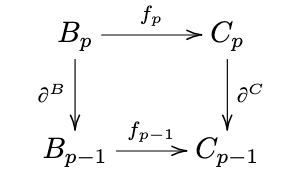Overview
A chain complex is a sequence of homomorphisms of abelian groups which generalize singular chains. The homology groups of a chain complex can be regarded as a measure of non-exactness: the sequence
is exact at (i.e., ) if and only if .
Homology groups are a result of a two-stage process: forming a chain complex of singular, simplicial, or cellular chains, then taking the homology groups of this chain complex.
Computations of homology groups typically involve two key theorems, homotopy equivalence and excision.
Relevant theorems:
- (Theorem) A short exact sequence of chain complexes induces a long exact sequence of homology groups
- (Theorem) (Relative) homology is homotopy invariant
- (Theorem) The relative homology of a subset is isomorphic to the subset with excision when the closure of the excision is in the interior of the subset
Related notes:
- Singular chains and singular homology
- Relative singular chains and relative homology
- Reduced singular chains and reduced homology
- Chain homotopies
- Homology with coefficients
Basic definitions
Chain complex
A chain complex
is a sequence consisting of an abelian group and a group homomorphism such that for all .
The data of all the abelian groups and homomorphisms is often abbreviated .
Chain map
Let and be chain complexes. A chain map consists of homomorphisms for all which satisfy
Homology groups
Homology groups of a chain complex
If is a chain complex, its homology groups are defined as
Elements of is called cycles, and elements of are called boundaries. If is a chain map, we define the induced homomorphism by
for a cycle . We often write for .
To see that is well-defined, we need to justify the following claims:
- The image of any element is indeed in : Since is a chain map, we know that for we have which is zero since .
- The class does not depend on choice of representative for : Suppose , meaning differ by a boundary. In particular, there exists some such that . The fact that consists of group homomorphism implies where the second equality again follows from chain map properties. Then differ by the boundary , so .
- The map is a homomorphism: This follows because every is a homomorphism, so they induce homomorphisms on the quotient.
Transclude of Topological-categories-and-functors#^0c28bf
Code snippets
(C_*, \partial)
